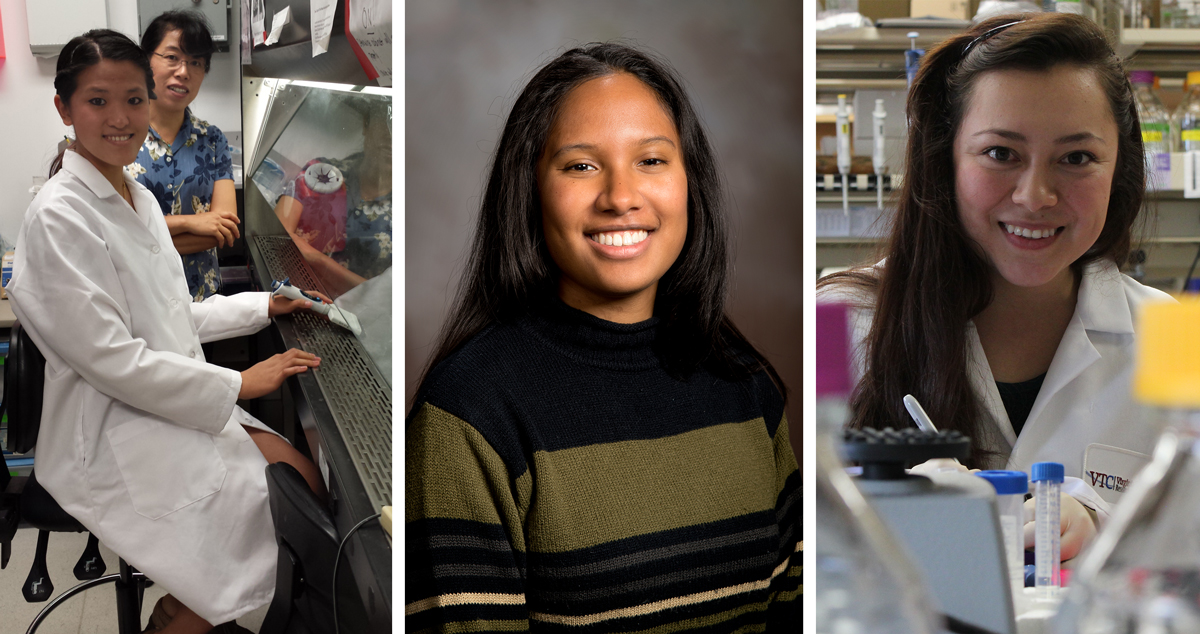Three students to present their work at the 2014 National Conference on Undergraduate Research

Three undergraduate students will represent Virginia Tech at the 2014 National Conference on Undergraduate Research.
Gabriela Carrillo of Orange County, Calif., a senior majoring in psychology in the College of Science, Erica Lee of Virginia Beach, Va., a senior majoring in sociology in the College of Liberal Arts and Human Sciences, and Christine Tin of Woodbridge, Va., a sophomore in biological sciences in the College of Science, will both present their work at the conference, which will be held April 3-5 at the University of Kentucky.
Gabriela Carrillo
Carrillo’s research looks at synaptic formation in early brain development. “I not only wanted to understand the driving factors that differentiated how a brain with a neurological disorder, like autism, would wire compared to one with normal development, but also speculate on how that may impact or direct behavioral treatment,” Carrillo said. “Coming from a family who struggled to obtain even an elementary education, I think undergraduate research has most importantly sparked confidence and awareness in my intellectual ability and love of learning. After graduation I hope to enroll in an MD/Ph.D. program and continue with neuroscience research.”
She worked under the mentorship on Michael Fox, associate professor at the Virginia Tech Carilion Research Institute and in biological sciences at Virginia Tech, through the Scieneering program. “Gabby has been a fantastic addition to our lab. She is unbelievably motivated, inquisitive, and perhaps the hardest working undergraduate student that I have encountered. Apparently no one has ever told her that there are only 24 hours in each day or that the human body requires sleep,” Fox said.
Erica Lee
Lee’s research investigates the interaction among racial identity, campus involvement, and progress toward on-time graduation. She worked under the mentorship of Rachelle Brunn, former assistant professor of sociology in the College of Liberal Arts and Human Sciences who is now an assistant professor at Fairfield University.
“Ms. Lee’s ambition, discipline, and passion for research are unparalleled among undergraduate scholars. I have not met another undergraduate who is so thoughtful and genuinely excited about conducting research,” said Brunn.
“My interests in undergraduate research were really ‘sparked’ as I was completing coursework for a first-year composition course, which focused on research and featured a paper as the major project,” said Lee. “I was very motivated to write and fascinated by my topic [the experience of black students in secondary education] and I was surprised by the research findings I read. I felt that many people were not aware of the disparate conditions within the education system, and that by participating in research I was somehow educating and advocating.”
Christine Tin
Tin’s research looks at ways to increase the efficacy of rotavirus vaccines through probiotics. She worked under the mentorship of Lijuan Yuan, associate professor of virology at the Virginia-Maryland Regional College of Veterinary Medicine.
“Christine Tin is the very best undergraduate student I have mentored at Virginia Tech. She is a very fast learner. Her problem-solving skills on the bench are superb. She expresses clear logic thinking in resolving obstacles when performing adjustment and standardization of laboratory procedures and parameters,” said Yuan. “During a short time she was able to produce high quality experimental data that will be included in two major publications from my lab.”
“Rotavirus kills approximately 453,000 children each year worldwide, despite the disease being vaccine-preventable, proving current vaccines are not as effective as they could be,” Tin said. “What really strikes me is that, as only a rising sophomore, I have been able to contribute to immunological discoveries that no one else in the world is aware of.”
Undergraduate Research
The 2014 National Conference on Undergraduate Research anticipates nearly 4,000 students from around the country will present their research and creative endeavors. The conference provides students a large-scale opportunity to present their research to their peers and get feedback from others in their fields.
“Undergraduate research can be an important tool for students to get hands-on experience outside the classroom in collaboration with faculty members,” said Jill Sible, assistant provost for undergraduate education. “I encourage students who are interested in pursuing undergraduate research opportunities to search for programs both on campus and at other institutions that may provide money or academic credit in exchange for a rich learning experience.”
The Office on Undergraduate Research is one resource on Virginia Tech’s campus to find programs and opportunities. The office’s website and Facebook page keep students and faculty members up-to-date on program applications and conferences. Deadlines for summer programs vary throughout the spring semester.
Dedicated to its motto, Ut Prosim (That I May Serve), Virginia Tech takes a hands-on, engaging approach to education, preparing scholars to be leaders in their fields and communities. As the commonwealth’s most comprehensive university and its leading research institution, Virginia Tech offers 240 undergraduate and graduate degree programs to more than 31,000 students and manages a research portfolio of $513 million. The university fulfills its land-grant mission of transforming knowledge to practice through technological leadership and by fueling economic growth and job creation locally, regionally, and across Virginia.









